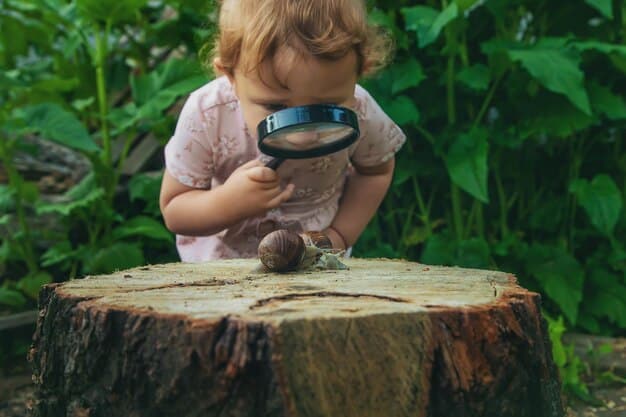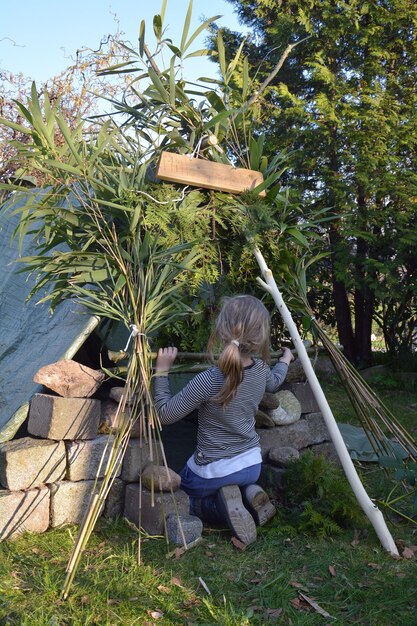Outdoor Play Benefits: Physical, Cognitive & Social Child Development

Outdoor play significantly enhances child development by fostering physical health through active movement, stimulating cognitive growth via exploration and problem-solving, and building crucial social-emotional skills through collaborative interactions and imaginative experiences.
In a world increasingly dominated by screens and indoor activities, the timeless appeal and profound benefits of allowing children to play outdoors often get overlooked. Understanding How Does Outdoor Play Benefit Child Development? Exploring the Physical, Cognitive, and Social Advantages is crucial for parents and educators alike to foster well-rounded growth.
The Irrefutable Link between Outdoor Play and Physical Well-being
Outdoor play is not merely a fun pastime; it is a foundational pillar for a child’s physical development. Engaging with the natural environment provides unparalleled opportunities for gross motor skill development, cardiovascular health, and the establishment of healthy habits that can last a lifetime.
Unstructured outdoor play, unlike regimented sports, allows children to move freely and creatively, using their bodies in varied ways. This natural movement supports the development of crucial physical attributes.
Developing Gross Motor Skills and Coordination
Running, jumping, climbing, swinging, and sliding are all activities that inherently strengthen large muscle groups. These actions contribute significantly to a child’s agility, balance, and overall body coordination. It’s in the unstructured environment of an outdoor space that these skills are truly honed.
- Running and Chasing: Enhances cardiovascular endurance, leg strength, and speed.
- Climbing and Balancing: Improves core strength, spatial awareness, and problem-solving as children navigate obstacles.
- Throwing and Catching: Develops hand-eye coordination and fine motor control, even when using larger objects like a ball.
The varied terrains found outdoors, from grassy hills to uneven paths, naturally challenge a child’s balance and proprioception. This constant adaptation helps build a more robust and responsive physical system.
Promoting Cardiovascular Health and Energy Regulation
Regular physical activity outdoors directly contributes to better cardiovascular health. Children engaged in active play outdoors tend to have lower risks of obesity and related health issues. The sustained energy expenditure during outdoor play helps manage weight and promotes a healthy metabolism.
This active lifestyle also aids in energy regulation, helping children burn off excess energy in a positive way, which can lead to better focus and sleep patterns.
In conclusion, the physical benefits of outdoor play extend far beyond simple exercise. They lay the groundwork for a healthy body, improve motor skills, and instill a lifelong appreciation for an active lifestyle, countering the sedentary tendencies of modern life. Children who spend more time outside are less likely to experience issues related to childhood obesity, a growing concern in many parts of the world.

Cognitive Growth: Stimulation Beyond the Classroom Walls
Beyond the obvious physical advantages, outdoor play serves as a profound catalyst for cognitive development. The natural world offers a dynamic, multi-sensory environment that stimulates curiosity, problem-solving skills, and abstract thinking in ways that indoor settings often cannot replicate.
When children engage with nature, they are constantly observing, experimenting, and making connections, which are fundamental processes for cognitive growth.
Fostering Problem-Solving and Critical Thinking
Outdoor environments present children with organic challenges. Whether it’s figuring out how to build a dam in a small stream, navigating a tricky climbing structure, or devising rules for an imaginative game, these scenarios demand problem-solving and critical thinking. There’s no instruction manual; children must observe, hypothesize, and test solutions.
This hands-on, experiential learning is far more effective for developing these skills than passive instruction. Children learn to adapt, innovate, and persevere in the face of natural obstacles.
Enhancing Sensory Perception and Observation Skills
The outdoors bombards children, in a positive way, with sensory input. The sounds of birds, the smells of flowers, the textures of leaves and bark, the feeling of wind or sun – all contribute to a rich sensory experience that refines their perception. This heightened sensory awareness translates into improved observation skills.
Children learn to notice details, differentiate between stimuli, and process complex information from their surroundings. This foundational skill aids in academic learning and overall comprehension.
Exposure to natural light also plays a role in cognitive function, including improved mood and alertness, which indirectly supports learning. The sheer unpredictability of outdoor environments also forces children to think on their feet, further enhancing their adaptive cognitive processes. The freedom to explore and discover at their own pace fosters a deeper understanding of the world around them, setting the stage for future academic success and a lifelong love of learning. This aspect of cognitive development is often overlooked when considering the benefits of outdoor play, yet it is profoundly impactful.
Social and Emotional Development: The Playground as a Classroom
Outdoor play environments, particularly playgrounds and open natural spaces, are dynamic social laboratories. They provide fertile ground for children to develop essential social and emotional skills, fostering cooperation, empathy, conflict resolution, and self-regulation. Unlike structured indoor activities, outdoor play often necessitates teamwork and negotiation, pushing children to interact authentically.
These interactions are crucial for understanding social cues and building healthy relationships. The absence of strict rules, typical in spontaneous outdoor play, allows children to create their own social structures.
Cultivating Cooperation and Negotiation Skills
When children play together outdoors, they inevitably encounter situations that require collaboration. Whether they are building a fort, organizing a game of tag, or sharing playground equipment, they must learn to cooperate, compromise, and negotiate. These real-time interactions teach valuable lessons in teamwork and mutual respect.
- Sharing space and resources: Learning to take turns and share swings or play equipment.
- Collaborative games: Working together to achieve a common goal, like catching someone in a group game.
- Conflict resolution: Navigating disagreements over rules or turns, leading to practical negotiation.
These experiences are far more impactful than theoretical discussions about sharing, as the consequences of not cooperating are immediately apparent in their play.
Building Empathy and Self-Regulation
Outdoor play often involves various peer interactions that expose children to different perspectives and emotional responses. Witnessing a friend’s frustration, joy, or disappointment helps cultivate empathy. They learn to understand and respond to the emotions of others, which is vital for healthy social connections.
Furthermore, the physical challenges and occasional setbacks encountered outdoors (e.g., falling, losing a game) provide opportunities for children to practice self-regulation. They learn to manage their emotions, cope with minor frustrations, and persevere, developing resilience. The exhilaration of overcoming a fear, such as climbing to the top of a slide, also boosts self-confidence and self-efficacy. Outdoor settings also naturally promote mindfulness as children are immersed in the present moment, listening to natural sounds and observing their surroundings. This focus on the “here and now” helps reduce stress and can improve emotional regulation over time. The unstructured nature of play outside also allows for children to practice leadership and followership, depending on the game or activity, which are critical social skills for later life.
The Role of Nature Connection in Child Development
A profound, yet often underestimated, benefit of outdoor play is the opportunity it provides for children to connect with nature. This connection is not merely about being outside; it’s about interacting with the natural world – observing, touching, smelling, and discovering. This deep engagement with nature has distinct advantages for physical health, cognitive function, and emotional well-being which complements the broader benefits of outdoor play discussed previously.
A growing body of research highlights the positive impact of nature exposure, often referred to as “Vitamin N,” on various aspects of child development. It promotes a sense of wonder and appreciation for the environment that can last a lifetime
Boosting Creativity and Imagination through Natural Elements
The unstructured and open-ended nature of the outdoors fuels creativity like no other environment. Natural elements such as sticks, stones, leaves, and mud become versatile props for imaginative play. A fallen log can be a pirate ship, a stick a magic wand, and a patch of grass a secret garden.
Unlike manufactured toys, natural elements do not dictate how they should be used, leaving infinite possibilities for children to create their own narratives and scenarios. This fosters divergent thinking and problem-solving in a playful context, critical for innovation.
Reducing Stress and Enhancing Well-being
Spending time in nature has been consistently linked to reduced stress levels and improved psychological well-being in both children and adults. The calming effect of natural environments can help children manage anxiety, reduce hyperactivity, and improve overall mood. The sensory input from nature is often soothing, providing a restorative effect.
Engagement with natural elements offers a break from the constant stimulation of modern life, allowing children to be present and calm. The simple act of observing a bird or feeling the breeze can be incredibly grounding. This reduction in stress fosters a positive emotional state, making children more receptive to learning and social interactions. Furthermore, exposure to sunlight aids in Vitamin D production, which impacts mood and bone health. Children who regularly connect with nature often develop a greater sense of environmental stewardship, understanding their role in protecting natural resources. This also translates into a broader sense of responsibility and interconnectedness with the world around them, a vital aspect of holistic development. The unique challenges presented by natural landscapes encourage children to assess risks, fostering better judgment and decision-making abilities that are transferable to other areas of life.
Addressing Common Barriers and Encouraging More Outdoor Play
Despite the overwhelming evidence supporting the benefits of outdoor play, several modern factors act as significant impediments to children spending time outdoors. Understanding these barriers is the first step toward implementing effective strategies that encourage more frequent and meaningful engagement with the natural world rather than just limiting screen time. It’s about designing environments and parenting styles that prioritize outdoor activity.
Modern lifestyles, increasingly urbanized environments, and safety concerns often reduce opportunities for children to experience unstructured outdoor play, creating a disparity between desirable outcomes and current realities.
Overcoming Safety Concerns and Limited Access to Green Spaces
Parents often express concerns about safety, including traffic, strangers, and even environmental hazards, which can limit their willingness to allow children to play freely outdoors. Urbanization also means fewer accessible green spaces, particularly in densely populated areas.
Addressing these concerns requires a multi-faceted approach:
- Creating safe play environments: Developing and maintaining well-lit, supervised parks and communal green spaces.
- Community initiatives: Organizing parent-led play groups or neighborhood watch programs to create a sense of collective safety.
- Advocacy for green infrastructure: Pushing for urban planning that integrates more parks, nature trails, and accessible open spaces within residential areas.
Educating parents on realistic risks versus perceived risks can also play a crucial role in empowering them to allow more outdoor play. Promoting programs that teach children about outdoor safety can also build confidence for both children and caregivers, making outdoor play more accessible and enjoyable for everyone involved.
Balancing Screen Time and Structured Activities
In the digital age, screen time presents a significant challenge to outdoor play. Children are increasingly drawn to tablets, video games, and television, often at the expense of outdoor exploration. Additionally, many children have highly structured schedules filled with extracurricular activities, leaving little room for free, unstructured play.
To mitigate these effects:
Parents can set clear limits on screen time and designate specific times for outdoor activities. Making outdoor play a non-negotiable part of the daily routine can help embed it as a healthy habit. Creating inviting outdoor play spaces at home, whether a backyard garden or just an accessible balcony, can also encourage spontaneous play.
Schools and community organizations can also integrate more outdoor learning and play into their curricula and programs, demonstrating the value of nature-based experiences. For instance, holding classes outdoors or organizing nature-based field trips can expose children to the benefits of natural environments without requiring significant changes to family routines. Encouraging children to see the outdoors as an extension of their learning and discovery can shift their perception and increase their willingness to engage with it. Ultimately, fostering an appreciation for nature from a young age can build a foundation for a lifelong love of outdoor activities, ensuring that generations continue to reap the diverse benefits of outdoor play for their holistic development.
Long-Term Impact: From Childhood to Lifelong Well-being
The advantages of outdoor play extend far beyond immediate childhood benefits, influencing an individual’s health, resilience, and happiness throughout their life. The foundations laid during early experiences outdoors contribute to an active lifestyle, improved mental health, and a deeper connection to the natural world in adulthood. These early experiences essentially program the body and mind for sustained well-being, demonstrating a significant return on investment for seemingly simple play activities.
Understanding these long-term ramifications underscores the importance of prioritizing outdoor play in childhood as a critical investment in future health and societal well-being. It is a proactive public health measure.
Cultivating a Lifelong Love for Physical Activity
Children who regularly engage in outdoor play are more likely to develop a positive relationship with physical activity. This early association of movement with fun and freedom can lead to a sustained commitment to exercise and an active lifestyle in adulthood. They are more likely to choose active hobbies and outdoor pursuits.
This early habituation to physical activity through play can significantly reduce the risk of developing chronic diseases associated with sedentary lifestyles, such as heart disease, diabetes, and obesity, later in life. It’s about instilling an intrinsic motivation for movement rather than viewing exercise as a chore.
Enhancing Mental Resilience and Stress Management
The skills in problem-solving, risk assessment, and self-regulation honed during outdoor play contribute to enhanced mental resilience. Adults who spent significant time playing outdoors as children often exhibit better coping mechanisms for stress and adversity.
The inherent calming and restorative effects of nature, experienced from a young age, can lead to a greater propensity to seek out natural environments for relaxation and mental rejuvenation in adulthood. This early connection fosters a valuable self-care tool.
Furthermore, the creative thinking and imaginative problem-solving nurtured in outdoor settings during childhood can translate into greater adaptability and innovation in adult professional and personal lives. The ability to navigate unstructured scenarios and adapt to unexpected challenges, a hallmark of outdoor play, becomes a vital asset in an ever-changing world. Ultimately, regular exposure to nature and physical activity during formative years creates a robust foundation for holistic well-being, contributing to happier, healthier, and more resilient individuals throughout their lifespan. These benefits not only impact personal quality of life but also foster more engaged and productive members of society. Recognizing these long-term gains elevates outdoor play from a simple childhood activity to a critical developmental imperative.
| Key Benefit | Brief Description |
|---|---|
| 🏃 Physical Health | Enhances motor skills, cardiovascular health, and reduces obesity risk through active movement. |
| 🧠 Cognitive Growth | Stimulates problem-solving, critical thinking, and sensory perception through exploration. |
| 🤝 Social & Emotional Skills | Fosters cooperation, empathy, and self-regulation through peer interactions and imaginative play. |
| 🌳 Nature Connection | Boosts creativity, reduces stress, and promotes environmental appreciation. |

Frequently Asked Questions About Outdoor Play
The most significant physical benefit is the comprehensive development of gross motor skills, agility, and balance. Activities like running, climbing, and jumping strengthen muscles, improve coordination, and contribute to overall cardiovascular health, laying the foundation for a physically active lifestyle.
Outdoor play stimulates cognitive development by encouraging problem-solving, critical thinking, and creativity. Children encounter new situations requiring them to observe, experiment, and adapt. Natural environments offer diverse sensory input, sharpening observation skills and fostering a natural curiosity.
Absolutely. Outdoor environments are ideal for fostering social skills. Children learn cooperation, negotiation, and conflict resolution as they share space, take turns, and engage in collaborative imaginative games. These interactions build empathy and improve their ability to navigate complex social dynamics effectively.
Connecting with nature significantly benefits emotional well-being by reducing stress and anxiety. The calming influence of natural settings helps children regulate emotions and improves their mood. It also provides a sense of wonder and connection to the world, fostering a more positive and grounded outlook.
Experts recommend that children engage in at least 60 minutes of moderate-to-vigorous physical activity daily, much of which can and should occur outdoors. Regular, unstructured outdoor play several times a week is ideal, fostering both physical activity and holistic developmental benefits.
Conclusion
The pervasive influence of screens and structured activities has undeniably shifted childhood experiences indoors, yet the immutable value of outdoor play for child development remains paramount. From cultivating robust physical health through active movement and honing cognitive functions via exploration and problem-solving, to nurturing vital social-emotional skills through collaborative interactions and imaginative experiences, the benefits are profound and multifaceted. Encouraging outdoor play is not merely about recreation; it is a fundamental investment in a child’s holistic growth, building resilient, creative, and well-adjusted individuals. As parents, educators, and communities, fostering opportunities for children to connect with the natural world and engage in free, unstructured play is an imperative for their current well-being and their long-term health and success.